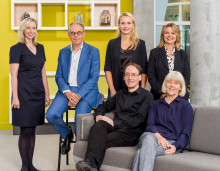
About us
The Max Planck Institute for Psycholinguistics is a world-leading research institute devoted to interdisciplinary studies of the science of language and communication, including departments on genetics, psychology, development, neurobiology and multimodality of these fundamental human abilities.
We investigate how children and adults acquire their language(s), how speaking and listening happen in real time, how the brain processes language, how the human genome contributes to building a language-ready brain, how multiple modalities (as in speech, gesture and sign) shape language and its use in diverse languages and how language is related to cognition and culture, and shaped by evolution.
We are part of the Max Planck Society, an independent non-governmental association of German-funded research institutes dedicated to fundamental research in the natural sciences, life sciences, social sciences, and the humanities.
The Max Planck Society is an equal opportunities employer. We recognise the positive value of diversity and inclusion, promote equity and challenge discrimination. We aim to provide a working environment with room for differences, where everyone feels a sense of belonging.
Our institute is situated on the campus of the Radboud University and has close collaborative links with the Donders Institute for Brain, Cognition and Behaviour and the Centre for Language Studies at Radboud University. We also work closely with other child development researchers as part of the Baby & Child Research Center.
Staff and students at the MPI have access to state-of-the art research and training facilities.
Institute leadership
The Max Planck Institute for Psycholinguistics is led by the Department Directors (Caroline Rowland, Peter Hagoort, Simon Fisher, Antje Meyer, and Asli Ozyurek), and the Chief Operating Officer (Cedric Gertzen). The role of Managing Director rotates once every two years. In 2023 and 2024, this position will be fulfilled by Simon Fisher.
Read more
Operations
The Operations department, headed by Chief Operating Officer Cedric Gertzen, is the organisational heart of the Institute. This department is home to HR, the Finance unit, the Communications & Press Office, Facility Management, and Travel Management for the entire MPI.
Read moreHistory
The Max Planck Institute for Psycholinguistics was opened in 1980. Its history dates back further to 1975, when the Max Planck Society asked Willem Levelt, a prominent figure in psychophysics and psycholinguistics, to set up a try-out project group in Germany focusing on language and psychology. The intention was that - if all went well - this project group would evolve into a permanent institute.
Not wanting to give up his professorship in Nijmegen, Willem Levelt approached both the board of the University and the Max Planck Society and successfully brokered a deal that would allow him to set up the project group in Nijmegen. It was the very first time that a Max Planck Institute was established outside Germany.
Over the years, the Max Planck Institute in Nijmegen has experienced a number of milestones. To find out more about our history and our path to success, read our timeline.
Advisory Boards
The Max Planck Institute for Psycholinguistics has a Board of Trustees and a Scientific Board. The role of the Board of Trustees is to connect Science and Society, and it comprises leading professionals from a wide range of backgrounds. The Scientific Board consists of prominent scientists from all over the world, who evaluate the scientific quality and quantity of our research once every three years.
Read morePeople
More than 200 people work at the MPI in Nijmegen, including PhD students, researchers, and support staff. Want to get in touch? Contact details are available on the People section of the website.
Read moreFormer departments and groups
Over the years, the MPI in Nijmegen has been home to numerous research departments and groups, such as Stephen C. Levinson's Language and Cognition Department.
Read more
Share this page